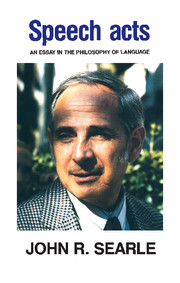2 - Expressions, meaning and speech acts
Published online by Cambridge University Press: 05 June 2012
Summary
The hypothesis then of this work is that speaking a language is engaging in a rule-governed form of behavior. To put it more briskly, talking is performing acts according to rules. In order to substantiate that hypothesis and explicate speech, I shall state some of the rules according to which we talk. The procedure which I shall follow is to state a set of necessary and sufficient conditions for the performance of particular kinds of speech acts and then extract from those conditions sets of semantic rules for the use of the linguistic devices which mark the utterances as speech acts of those kinds. That is a rather bigger task than perhaps it sounds, and this chapter will be devoted to preparing the ground for it by introducing distinctions between different kinds of speech acts, and discussing the notions of propositions, rules, meaning, and facts.
Expressions and kinds of speech acts
Let us begin this phase of our inquiry by making some distinctions which naturally suggest themselves to us as soon as we begin to reflect on simple speech situations. (The simplicity of the sentences in our examples will not detract from the generality of the distinctions we are trying to make.) Imagine a speaker and a hearer and suppose that in appropriate circumstances the speaker utters one of the following sentences:
Sam smokes habitually.
Does Sam smoke habitually?
Sam, smoke habitually!
Would that Sam smoked habitually.
Information
- Type
- Chapter
- Information
- Speech ActsAn Essay in the Philosophy of Language, pp. 22 - 53Publisher: Cambridge University PressPrint publication year: 1969
Accessibility standard: Unknown
Why this information is here
This section outlines the accessibility features of this content - including support for screen readers, full keyboard navigation and high-contrast display options. This may not be relevant for you.Accessibility Information
- 4
- Cited by
